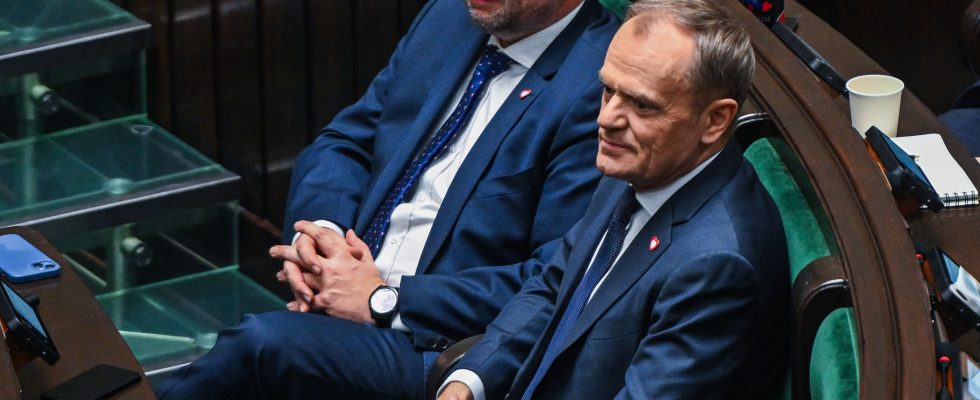Who will take over the control of public media? The new Polish government, recently led by pro-European Donald Tusk, is battling with the conservative opposition for control of public television, radio and the national news agency. Both camps accuse each other of lies and violation of the Constitution, each trying to impose its own direction.
Upon taking office on December 15, the new government began to overhaul public media institutions that had become, according to some, propaganda organs of the previous government led by the nationalist Law and Justice (PiS) party, in power for eight years. State-controlled media “have been transformed into mouthpieces for government propaganda”, Reporters Without Borders already estimated in a report in 2020.
The changes have sparked strong opposition from PiS, which says the new government has bypassed ordinary parliamentary procedure to implement them. Right-wing party MPs staged protests and rallies outside state media headquarters. President Andrzej Duda, considered an ally of PiS, even went so far as to denounce the reforms as “anarchy”.
Presidential veto of bill
In light of the measures recently taken by the new government, the president warned, Saturday December 24, that he would veto a bill which provided for financing of 3 billion zlotys, or 690 million euros, for public media. The Polish constitution in fact grants the president a broad right of veto, which only a two-thirds majority of parliamentarians can defuse. But Donald Tusk and his allies do not enjoy such a majority. In response, the government therefore decided to liquidate the public media.
This decision will “ensure the continuation of activities and restructuring” of the public radio, television and Polish press agency and “avoid the dismissal of employees” of these companies, explained Bartlomiej Sienkiewicz, the Polish Minister of Culture. Earlier, the executive shut down the public news channel TVP and fired public media executives in a bid to restore the latter’s impartiality. Media industry experts and free speech activists say that under PiS rule, TVP and other public media outlets have not acted neutrally, but as a conduit for the government.
Battle for TVP leadership
The PiS, for its part, assures that the changes made by the new government harm media pluralism, by suppressing the conservative voice. He also criticizes the way, illegal according to him, in which the changes were implemented without a bill being submitted to Parliament. Claims rejected by the government of Donald Tusk.
On Wednesday, December 27, the head of President Duda’s office accused the current Minister of Culture of behaving like “an aggressor.” “This is proof of the total helplessness of the authorities, who have not found any legal way to change the authorities of these companies,” wrote Marcin Mastalerek, member of the Polish Parliament, on X (ex-Twitter).
The day before, PiS had also appointed a new general director of Polish public television group TVP, although the Tusk government had already appointed someone else to the post. On Tuesday, PiS MP Joanna Lichocka said that the Polish National Media Council (RMN) had appointed Michał Adamczyk as general director of the public broadcasting group.
The RMN, created in 2016 when PiS was in power, was at the time given responsibility for appointing the heads of public media. Michal Adamczyk was a leading figure on TVP’s news broadcasts, which PiS opponents considered propaganda. The Ministry of Culture and the head of the Prime Minister’s office have not yet reacted to this matter.
Shortly before, the former TVP Supervisory Board, which did not accept its dissolution, appointed former PiS member Maciej Lopinski as general director. The culture minister said in a statement that Maciej Lopinski’s nomination was “legally invalid because it was adopted by a non-existent body.” This first standoff around public media portends a turbulent cohabitation between nationalist President Andrzej Duda, elected in 2020 for a five-year term, and new centrist Prime Minister Donald Tusk.
